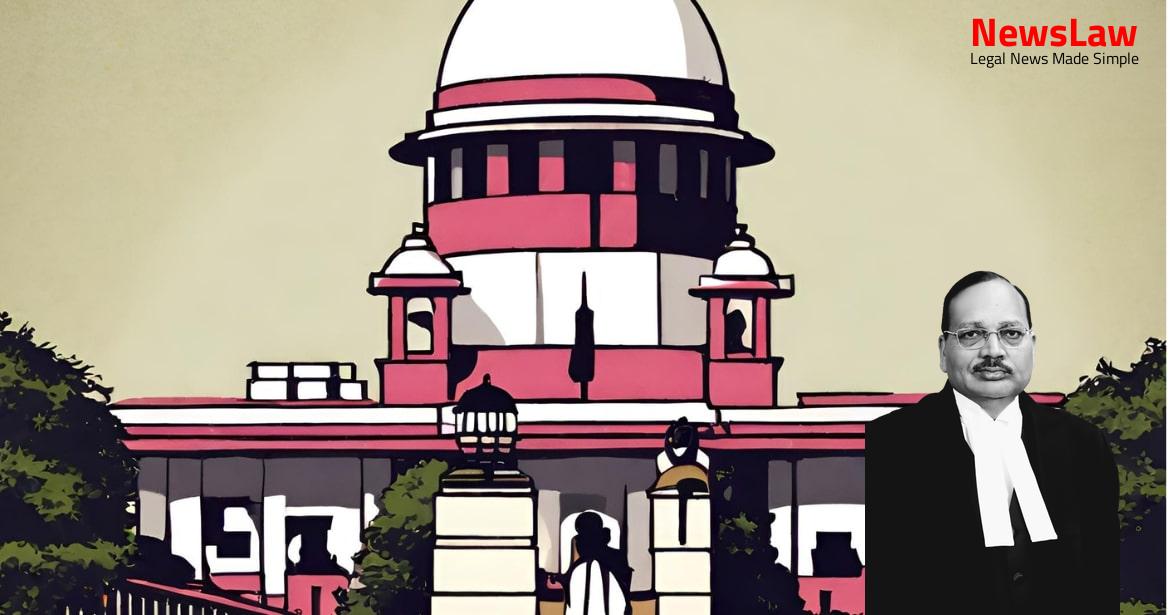In a recent landmark judgment, the Supreme Court of India delivered its final decision in the ‘Land Redemption’ case involving Bibi Fatima and Vithal Tukaram Kadam. The court thoroughly analyzed the nature of the document dated 29.04.1971 and its implications on the mortgage by conditional sale aspect. Stay tuned to learn more about the court’s ruling and its significance in legal proceedings.
Facts
- The appellants, original defendants, are aggrieved by the dismissal of their second appeal.
- The First Appellate Court reversed the dismissal of the suit for redemption of mortgage filed by the plaintiffs.
- The suit for redemption of mortgage was filed in 1980.
- The appellants failed to repay and redeem the property within the stipulated time as per the instalment bond.
- The conditional sale deed executed in 1971 for agricultural lands measuring 2½ acres was in favor of the defendant for Rs. 11,000.
- The appellants defaulted in payment of the first installment.
- An amount of Rs. 10,500 became outstanding after verification of accounts.
- Defendant no.1 obtained mutation of the lands in his name in 1976 and sold the lands to defendant no.2 in 1978.
- The suit for redemption was filed seven years later after the agreement period for repayment had expired.
- Possession had already been delivered to defendant no.1 on the date of the agreement.
- The First Appellate Court and the High Court interpreted the document as a mortgage by conditional sale.
- They determined that a debtor-creditor relationship existed rather than a transferor-transferee relationship.
- The nature of the document was seen as a mortgage with conditions attached.
Also Read: Land Dispute Resolution: Supreme Court Ruling on Specific Performance
Issue
- The agreement dated 29.04.1971, Exhibit 52, was questioned as to whether it was a mortgage by conditional sale or a sale with an option to repurchase.
- Plaintiffs had a debt of Rs.10,500/- owed to defendant no.1 for credit purchases.
- An instalment bond was executed on 26.04.1970 to repay the debt in three instalments.
- The first instalment fell due on Gudi Padwa day in 1971, 1972, and 1973.
- Upon failure to pay the first instalment in 1971, Exhibit 52 was executed on 29.04.1971.
- Defendant no.1 took possession and got mutation of the property done in his name in 1976, three years after the last instalment was due.
Analysis
- The plaintiffs’ financial limitations due to poor financial status make their lack of objection to the mutation three years later insufficient to interpret the agreement differently from the one dated 29.04.1971.
- An ostensible sale with possession and ownership transfer but with a reconveyance clause follows Section 58(c) of the Act, indicating a mortgage by conditional sale.
- A separate agreement for reconveyance, whether simultaneous or later, undermines the agreement’s status as a mortgage by conditional sale.
- The right to redeem under Article 61(a) of the Limitation Act 1963 is limited to 30 years.
- Determining whether an agreement is a mortgage by conditional sale or a sale with an option for repurchase requires consideration of the property valuation, transaction value, and reconveyance duration.
- The language used in the agreement may not always determine its nature, necessitating examining the intention of the parties and other circumstances holistically.
- The delay of 11 years in filing the suit for redemption was considered, but the suit was found to be within the limitation period.
- The dire financial situation of the plaintiffs is evident from having to mortgage their agricultural lands to cover daily necessities.
- The agreement dated 29.04.1971, being a Conditional Sale Deed, was determined to be a mortgage by conditional sale by the court.
- The Defendant No.1 subsequently resold the land to Defendant No.2 with a transaction involving Rs.11,000 and possession transfer.
- The determination of the nature of a document is crucial in legal proceedings.
- The true character of a transaction must be ascertained from the provisions of the deed along with surrounding circumstances.
- Clear and unambiguous words in a document should be given their true legal effect after considering surrounding evidence.
- If there is ambiguity in the language used, the intention can be understood by examining the contents of the deed and utilizing extrinsic evidence that is legally permissible.
- The agreement in Bibi Fatima was considered a mortgage by conditional sale, as the lands were still in possession of the respondent who raised a loan to discharge debts.
- The observations in Vithal Tukaram Kadam suggest that surrounding circumstances should be examined, but these are not helpful for the current case.
- The status of the appellant as a bonafide purchaser is deemed irrelevant in this case and may require further evidence to be determined.
- The issue of the appellant’s bonafide purchase can be considered in a separate proceeding against defendant no.1 if initiated by the appellant.
Also Read: Judicial Standards and Compulsory Retirement Case: Supreme Court of India Judgment
Decision
- The appeal has been dismissed by the court.
- The court finds no merit in the appeal.
- The court’s decision is final in this matter.
Case Title: GANPATI BABJI ALAMWAR (D) BY LRS. Vs. DIGAMBARRAO VENKATRAO BHADKE AND ORS. .
Case Number: C.A. No.-003960-003960 / 2011



